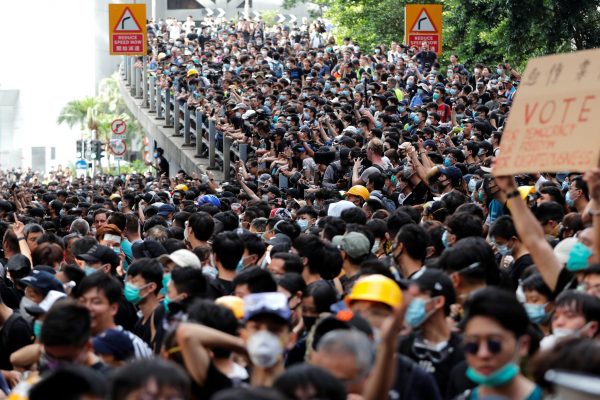Beijing thought the appointment of a capable administrator in Carrie Lam — rather than the unpopular CY Leung — as the city’s Chief Executive in 2017 would improve the social and political atmosphere in the aftermath of the unsuccessful Occupy Central movement. But the hasty introduction of this bill by the highly self-confident Lam has unexpectedly triggered the worst political crisis since 1997 within months.
The bill aimed to extradite a young Hong Kong man suspected of murdering his girlfriend in Taiwan back to the island, but it would also cover jurisdictions with which Hong Kong has no extradition treaty, including the mainland.
The lack of a rendition arrangement with mainland China even after the handover reveals the complexity of the legal issues involved and the enormous gap between the Chinese and Hong Kong legal systems. The Hong Kong people were deeply concerned about demolishing the separation of the two different legal systems without sufficient safeguards in carefully crafted legislation.
In the face of growing opposition toward the bill, Lam secured strong support from Beijing and pro-establishment parties to bulldoze the legislation with little consultation by mid-June.
Despite an estimated 1 million marching on 9 June, Lam’s response was a quick reiteration of the original legislative timetable. This prompted tens of thousands into a siege of the Legislative Council building and neighbouring roads on 12 June, resulting in violent confrontations and a shutdown of the government headquarters. In an attempt to quickly disperse angry protesters, police used force at a scale unprecedented since 1997, leading to widespread public outcry.
The government’s refusal to squarely address such popular concerns provoked another massive march on 16 June. An estimated 2 million people condemned the police’s excessive use of force and its designation of the earlier clashes as ‘riots’. They also demanded the immediate withdrawal of the bill and Lam’s resignation.
No Hong Kong leader has provoked such huge protests and clashes within such a short period of time. Marching on a hot and humid Sunday, the people came to voice their vote of no confidence to an unresponsive government. This massive show of people power has created a collective memory of a vibrant community fighting for its freedoms and rights.
Lam’s public apology and suspension of the legislation on 18 June came too late and could hardly save her fall from grace.
The political appointment system introduced by CH Tung in 2002 to enhance the accountability of principal officials has proven to be a failure — so far no senior official has resigned for their political errors since introduction of the bill. Senior officials, fully supported by Beijing, failed to listen to the voices of a wide segment of the community. They also failed to convince the people of the urgency of the legislation, after Taiwan rejected any extradition under such a bill.
Lam has alienated the community with her determination to pass the bill with a legislature dominated by pro-establishment figures that are not reflective of popular views. Their support for her has now become a serious political liability.
Beijing perceives these marches as yet another attempt by the opposition, and even Western governments, to challenge the authority of the Hong Kong Special Administrative Region (HKSAR) and central governments — and ultimately — to destabilise Hong Kong. With tensions growing between China and the United States on various fronts, Beijing does not want this controversy to become another thorny issue.
It is now clear that it is very difficult — if not impossible — for any Chief Executive to walk the fine line between the different constituencies of Beijing and Hong Kong. The political system designed in the Basic Law failed to provide an effective administration that can simultaneously respond to the demands of the people and secure Beijing’s trust.
This bill was not initiated by Beijing, but securing central support in such a high-profile manner has made it impossible for Lam to retract it on her own. On 21 June, thousands of young Hong Kongers blocked the throughways in the Admiralty area, causing traffic disruptions and another shutdown of the government compound. They later encircled the police headquarters for 15 hours. The police were dangerously sandwiched between an increasingly exasperated population and an ineffective administration.
More protests and public defiance may loom on the horizon unless the government takes decisive action to address the latest demands raised by different sectors of the community. This includes the bill’s full withdrawal, not designating the previous protests as ‘riots’ and establishing an independent inquiry into the whole event.
At the core of Hong Kong people’s resistance is their deep concern with their perceived erosion of freedoms and rights and the blurring of the parameters of ‘One Country, Two Systems’. The still unfolding crisis has again demonstrated the mistrust between Hong Kong and the mainland and the challenges in governing a liberal, pluralistic Hong Kong under an authoritarian one-party state.
It will take a new mindset for both the Chinese and HKSAR governments to address these systemic challenges. The ability of the leadership in both places to explore a pragmatic and innovative solution is unclear, especially when Beijing considers the international environment to be threatening.
Dr Peter TY Cheung is Associate Professor of Politics and Public Administration at the University of Hong Kong.

